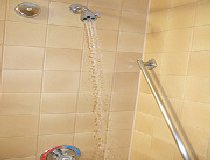The principles of Ghusl (taking bath)
14/10/2014| IslamWeb
A brief summary of the principles of Ghusl is as follows:
First,A Muslim should make his/her intention for purification, then wash the private parts. Then make Wudhoo' (ablution) like the Wudhoo' done for prayer, then pour water on his right side, then the left side. Then water should be poured on his head, covering the entire body with water. It is also reported in the Sunnah (Tradition of the Prophet Muhammad  that washing the feet should be delayed until the end of the Ghusl.
that washing the feet should be delayed until the end of the Ghusl.
It is reported on the authority of Aa'ishah  who said that the Messenger of Allah
who said that the Messenger of Allah  when performing Ghusl from Janabah (ritual impurity), used to wash his hands, then wash his private parts with his left hand. After that he performed Wudhoo' like that for prayer. Next, he took some water and ran his fingers in the roots of his hair until he used three handful of water on his head. He would then go on pouring water on the rest of his body and wash his legs. [Muslim]
when performing Ghusl from Janabah (ritual impurity), used to wash his hands, then wash his private parts with his left hand. After that he performed Wudhoo' like that for prayer. Next, he took some water and ran his fingers in the roots of his hair until he used three handful of water on his head. He would then go on pouring water on the rest of his body and wash his legs. [Muslim]
1. The person taking a bath should first of all wash both hands up to the wrists, and then wash the private parts. The hands and private parts should be washed irrespective of whether there is any impurity on them or not. Both these have to be washed under all conditions. Thereafter, any impurity found on the rest of the body should be washed. Then make Wudhoo'. If anyone is sitting on a stool or stone while bathing, then the feet should also be washed when making Wudhoo'. But if anyone is sitting in a place where the water accumulates and he will have to wash the feet again after completing the Ghusl, then the entire Wudhoo' should be made but the feet should not be washed.
After performing Wudhoo', pour water on the head three times. Thereafter pour water over the right and left shoulders three times each in such a way that water reaches the entire body. Thereafter move from this place and go to a clean spot and wash the feet. If the feet were washed when making Wudhoo' there will be no need to wash them again.
2. Whilst pouring water over the body the first time rub the body well so that water reaches everywhere properly and no place remains dry.
3. The above method of Ghusl is according to the Sunnah. Some of the items explained above are Fardh (obligatory) without which Ghusl will not be complete and the person will remain impure. Some other items are Sunnah (recommended but not obligatory). Observing them entails reward, and by not carrying them out, Ghusl will still be complete. The Fardh acts are only three:
(a) Gargle the mouth in such a way that water reaches everywhere.
(b) Wash the nose up to the soft bone.
(c) Pour water over the entire body.
4. While bathing, one should not face the Qiblah (direction of the Ka'bah). Too much water should not be used, nor should so little be used that one is unable to wash thoroughly. The bath should be taken at such a place that no one can see the bather. One should not talk while bathing; he should cover himself up first and then wash the feet.
5. If the bathing place is secluded where no one can see, then it is permissible to bathe naked, irrespective of whether one is standing or sitting and irrespective of whether the roof is covered or not. However, it is better to sit and bathe because there is more modesty in this. To expose the body from the navel to the knees before anyone is a sin. Many women bath completely naked in the presence of other women. This is a very evil and shameful act.
6. Even if an area equal to a hair's breadth is left dry, Ghusl will not be complete. In the same way, if anyone forgot to gargle the mouth or wash the nose, Ghusl will not be complete.
7. If a woman pours water on her head three times, that will be sufficient and she does not need to undo the braids. This is based on the Hadeeth (narration) of Umm Salamah  . It is narrated that she asked the Prophet
. It is narrated that she asked the Prophet  : "I am a woman with braided hair; should I undo it when doing Ghusl for Janabah?" He
: "I am a woman with braided hair; should I undo it when doing Ghusl for Janabah?" He  answered: “No, rather it will be sufficient for you to pour three handfuls of water on your head, then pour water over yourself and you will be purified.” [Muslim].Unless the Ghusl is after the menses, then she has to undo the braids and wash her hair thoroughly.
answered: “No, rather it will be sufficient for you to pour three handfuls of water on your head, then pour water over yourself and you will be purified.” [Muslim].Unless the Ghusl is after the menses, then she has to undo the braids and wash her hair thoroughly.
www.islamweb.net

